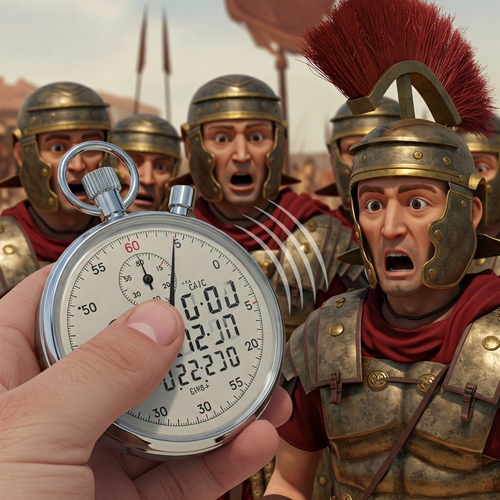Why Was Touching the Ark of God a Fatal Mistake?
The oxen stumbled. Without thinking, Uzzah reached out his hand to steady the Ark of God. In that split second, everything changed. The celebration turned to horror as Uzzah fell dead beside the cart, struck down by the Lord he’d been trying to serve. The music stopped. The dancing ceased. And King David, who’d organised the joyful procession to bring God’s Ark to Jerusalem, was left angry. And afraid.
This shocking account in 2 Samuel 6 continues to trouble readers today. Why was touching of the ark fatal? Wasn’t Uzzah trying to be helpful? The answer lies in understanding not just what happened that day, but who God is and what the Ark represented in Israel’s worship…
WHY WAS TOUCHING OF THE ARK FATAL? THE HISTORICAL CONTEXT
The Ark was no ordinary religious relic. Built according to God’s exact specifications, the gold-covered chest contained the tablets of the Ten Commandments, Aaron’s rod, and a jar of manna. More significantly, it represented God’s throne on earth—the place where His glory dwelt among His people. When Israel honoured God’s requirements for the Ark, it was a source of blessing. When they didn’t, it became a source of judgement.
THE FATAL PROGRESSION: HOW ISRAEL MISHANDLED THE ARK
Before we judge Uzzah’s actions too quickly, we must understand the series of missteps that led to that fateful moment. Each departure from God’s prescribed way represented a step away from reverence and toward tragedy.
God’s Instructions Were Crystal Clear: The book of Numbers details explicit commands for transporting the Ark: it was to be covered with specific materials, carried by designated Levites from the family of Kohath, and moved using poles inserted through its rings. These weren’t arbitrary rules but divine safeguards, ensuring both the proper handling of God’s holy presence and the protection of those tasked with its transport.
The Philistine Method Replaced Divine Design: Instead of following God’s prescribed method, David and his leaders opted to transport the Ark on a new cart—the same method the Philistines had used when returning the Ark years earlier. This seemingly practical decision revealed a subtle shift: human wisdom had supplanted divine instruction. The very people who should have known better were imitating those who didn’t know God at all.
Sacred Became Common: By placing the Ark on a cart like ordinary cargo, Israel unwittingly downgraded its status. The Ark, which represented God’s throne and contained sacred items from Israel’s redemptive history, was being treated like a piece of furniture rather than the holy vessel it was. This casual approach toward holy things would prove devastating.
History’s Warnings Were Ignored: The past provided plenty of cautionary tales about mishandling the Ark. The Philistines had suffered plagues. The men of Beth Shemesh were struck down for looking into it. Each incident demonstrated that approaching God’s holiness casually carried serious consequences, yet these lessons went unheeded.
Celebration Overshadowed Sanctity: David’s desire to bring the Ark to Jerusalem was good, but his execution was flawed. His enthusiasm for worship led him to organise a grand celebration with music and dancing, yet in his excitement, he overlooked the solemn protocols God had established. Sometimes our very zeal for God can blind us to His requirements.
The Final Fatal Touch: Uzzah’s attempt to steady the Ark represented the culmination of this progressive departure from reverence. Though his intention was to prevent the Ark from falling, his action revealed a presumptuous familiarity with holy things. In reaching out his hand, he acted as though his touch was cleaner than the dirt that might have soiled the Ark—a deadly miscalculation.
THE NATURE OF GOD’S HOLINESS: MORE THAN JUST MORAL PERFECTION
The sooner we understand the following, the better it will be for us:
- Holiness: Beyond Moral Purity: God’s holiness isn’t merely one attribute among many—it’s the foundational reality that shapes how we’re to approach Him. When we think of holiness, we often reduce it to moral perfection—the absence of sin. But God’s holiness also encompasses His absolute otherness, His complete separation from everything created. He isn’t merely the highest being in the universe; He is utterly, transcendently unique and set apart in His very nature, existing in unapproachable light.
- Precise Obedience Flows from His Nature: God’s holiness requires exact obedience not because He is pedantic, but because His nature demands it. Just as we wouldn’t casually handle nuclear material or approach a live wire, God’s holiness requires specific protocols for our protection and His glory. His commands aren’t arbitrary but flow from who He is.
- The Peril of Casual Familiarity: Regular exposure to holy things can breed a dangerous familiarity. Like Uzzah, who had housed the Ark in his father’s home, we can begin to treat the sacred as ordinary. This gradual descent from reverence to casualness often precedes our gravest spiritual mistakes. What we handle regularly, we tend to handle carelessly.
- Protected by His Holiness: God’s holiness, while terrifying, actually serves to protect His people. By maintaining clear boundaries between the sacred and common, God preserves both His worship and His worshippers from corruption. When we try to blur these lines, we endanger ourselves and diminish our understanding of who God is.
- His Terms, Not Ours: The fundamental error in approaching God is thinking we can do so on our own terms. Whether through tradition, convenience, or sincere but misguided intentions, we often try to approach God in ways He hasn’t authorised. His holiness demands that we come to Him exactly as He prescribes—through the means He has provided.
CONCLUSION: WHY WAS TOUCHING OF THE ARK FATAL?
The movement of the Ark should have been a solemn, sacred procession carried out according to God’s commands. Instead, it became a celebration on human terms, with deadly consequences. God’s response to Uzzah’s touch wasn’t an arbitrary display of divine temper – it was a necessary reassertion of His holiness and the proper order of things.
This incident points us to a fundamental truth: we cannot approach God on our own terms, no matter how well-intentioned we may be. The story of Uzzah reminds us: God’s holiness isn’t a suggestion but an essential attribute that demands our total reverence. And our unqualified obedience.
WHY WAS TOUCHING OF THE ARK FATAL?—RELATED FAQs
But Uzzah was just trying to help—how’s that wrong? While Uzzah’s intentions may have been good, this incident teaches us good intentions don’t supersede God’s clear commands. God had explicitly forbidden touching the Ark, and His holiness demands obedience regardless of our motives. This shows us sincerity alone isn’t enough—we’re to approach God as He has commanded, not as we think best.
- Wasn’t God’s punishment unnecessarily harsh? God’s response wasn’t arbitrary but rather consistent with His character and previous warnings about approaching His holiness improperly. The severity of the punishment reflects the seriousness of presuming to approach God on our own terms. Remember: God had already provided clear instructions for protecting both the Ark and those who transported it.
- How does this square with God’s love? God’s love and holiness aren’t in conflict—they’re both essential aspects of His character. His love is demonstrated precisely in giving clear instructions for how to approach Him safely, while His holiness ensures His love remains pure and uncompromised. In fact, it’s because God loves His people that He maintains the boundaries that protect them from treating Him casually.
Should we really judge God’s actions by modern standards? Judging God’s actions by human standards fundamentally misunderstands who God is. Our limited, fallen perspective isn’t equipped to pass judgement on the actions of an infinitely holy and wise God. Instead, we should allow His actions to shape our understanding of holiness and justice.
- How should we approach God today? We must approach God exclusively through the means He has provided—through Christ and according to His Word. While we don’t have the physical Ark today, the principle remains: we come to God on His terms, not ours. This means approaching Him through prayer, worship, and the sacraments as He has prescribed in Scripture.
- What if we’re sincere but mistaken in how we worship? Sincerity, 9 important, doesn’t validate worship that contradicts God’s revealed will. Just as David’s enthusiasm couldn’t justify improper transport of the Ark, our good intentions don’t sanctify unbiblical worship practices. God’s Word, not our hearts, must be the standard for how we approach Him.
How do we balance joy and reverence in worship? True joy in worship flows from, rather than conflicts with, proper reverence for God’s holiness. When we understand who God is and approach Him as He commands, we experience both the freedom and restraint that characterize biblical worship. The key is allowing Scripture to define both our joy and our reverence.
- Why is God’s holiness good news—and not bad—for believers? God’s holiness is good news because it guarantees the purity and permanence of His love, justice, and promises. His holiness means He cannot be corrupted or compromised, ensuring His covenant faithfulness endures forever. Moreover, in Christ, this holy God has made a way for unholy people to draw near safely.
- How can we avoid similar mistakes in our worship today? We avoid Uzzah’s error by studying Scripture carefully, submitting to God’s prescribed ways of worship, and maintaining a proper reverence for holy things. This means regularly examining our worship practices against Scripture’s teaching and resisting the tendency to prioritize convenience or cultural relevance over biblical faithfulness.
What’s the ultimate lesson from Uzzah’s story for modern believers? The ultimate lesson is that Jesus Christ is our only safe approach to a holy God. Where Uzzah’s touch brought death, Christ’s mediation brings life. Through His perfect obedience and sacrificial death, Christ has become our ark-bearer, making it possible for unholy people to draw near to a holy God without being consumed.
WHY WAS TOUCHING OF THE ARK FATAL?—OUR RELATED POSTS
Editor’s Pick

Does God Still Talk Directly To His People?
"God told me to take this job." "I feel the Lord leading me to marry her." Such phrases echo through [...]

Will There Be a Third Jewish Temple in Jerusalem?
Throughout history, God's dwelling among His people has taken several forms—from the wilderness tabernacle to Solomon's magnificent temple, to its [...]

Filled Vs Baptised With the Spirit: What’s the Difference?
Baptised with the Holy Spirit vs. filled with the Spirit: are these simply different terms for the same spiritual experience, [...]

Joshua & Yeshua: Exploring the Name and Life Connections
When we encounter names in Scripture, they often carry profound theological significance. None more so than the name shared by [...]

Can Evil Spirits Read Minds? What Scripture Actually Teaches
Ever worried Satan or his demons can see your thoughts? Perhaps you’ve had a sinful thought and immediately felt exposed, [...]
Does a Husband’s Faith Save His Family? Acts 16:31 Explained
"Believe in the Lord Jesus, and you will be saved, you and your household." This promise in Acts 16:31 has [...]

Did Jesus Die Too Soon? Was Pilate’s Surprise Unfounded?
Sceptics point to Jesus' relatively short time on the cross as evidence the Gospel accounts are unreliable. After all, when [...]

Shouldn’t the Book of Enoch Be In the Bible? Why Isn’t It?
The Book of Enoch has fascinated scholars, theologians, and curious readers for centuries. Mentioned in the New Testament and revered [...]

‘Out of Egypt I Called My Son’: Did Matthew Misuse Hosea 11:1?
When Matthew quotes Hosea 11:1 in his Gospel—“Out of Egypt I called my son”—he draws a connection that has puzzled [...]

Bible Allusions: How They Enrich Our Grasp of God’s Word
Ever experienced that moment when you're reading Scripture and suddenly recognise an echo of another passage? That spark of recognition [...]






